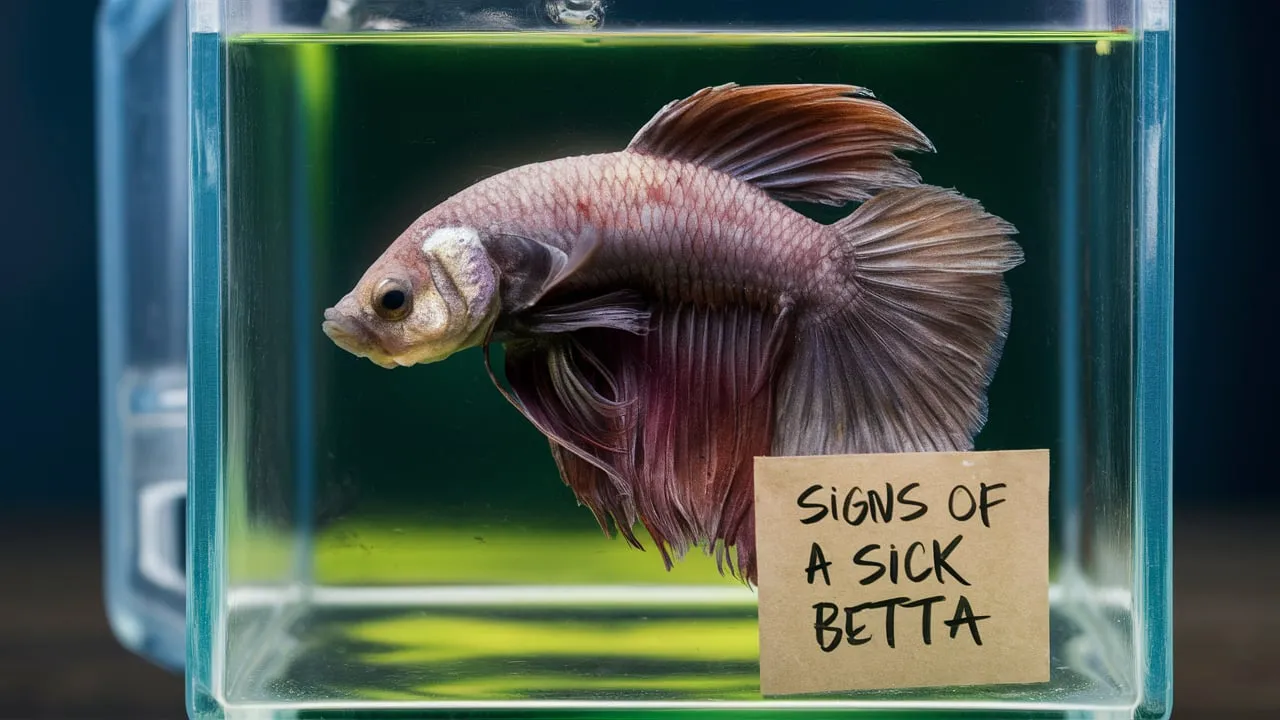Recognizing Signs Of A Sick Betta is crucial for providing timely care and ensuring their well-being. This Betta Fish Guide will explore the common symptoms of betta illness, offer insights into potential causes, and provide practical tips for addressing health concerns.
Understanding Betta Fish Health
What Makes a Betta Fish Healthy?
Healthy betta fish are active, vibrant, and exhibit normal behaviors. They should have clear, bright eyes, a healthy appetite, and a body free of any visible sores or lesions. Their fins should be fully extended and free of tears or fraying.
Why is it Important to Know the Signs of a Sick Betta?
Early detection is key to successful treatment. Catching a disease in its early stages can significantly improve the chances of a full recovery. Ignoring the signs can lead to complications, potentially causing irreversible damage or even death.
Common Signs of a Sick Betta Fish: Behavioral Changes
Loss of Appetite
One of the most obvious signs of a sick betta is a loss of appetite. If your betta is normally a voracious eater but suddenly refuses food, it could be a sign of illness.
Lethargy
A healthy betta is typically active and curious, exploring its tank and interacting with its environment. If your betta is unusually sluggish or spends most of its time resting at the bottom of the tank, it could be a sign of illness.
Hiding
Betta fish are generally shy creatures, but they should still be visible in their tank. If your betta is constantly hiding in its decorations or at the bottom of the tank, it could be a sign of stress or illness.
Difficulty Breathing
Observe your betta’s breathing patterns. If it’s gasping at the surface or appears to be struggling to breathe, it could be a sign of a respiratory infection or other health problems.
Aggression
While betta fish are known for their territorial nature, excessive aggression or biting at tank mates can indicate stress or illness.

Common Signs of a Sick Betta Fish: Physical Changes
Fin Rot
Fin rot is a common bacterial infection that affects the fins of betta fish. It can cause the fins to become frayed, torn, or even completely disintegrate.
Common Causes of Fin Rot
- Poor water quality
- Stress
- Injury
Treatment
- Water Changes: Frequent water changes with dechlorinated water are essential.
- Antibiotics: In severe cases, antibiotics may be necessary. Consult with a veterinarian or experienced aquarist for guidance.
Fungal Infections
Fungal infections can appear as white or gray patches on the betta’s body, fins, or gills. They can also cause the fins to become clamped or the betta to become lethargic.
Common Causes of Fungal Infections:
- Poor water quality
- Stress
- Injury
Treatment
- Water Changes: Frequent water changes with dechlorinated water are essential.
- Anti-fungal medication: Anti-fungal medications can be purchased from pet stores or online.
Ich (White Spot Disease)
Ich is a common parasitic infection that causes white spots to appear on the betta’s body. It can also cause the betta to become lethargic, lose its appetite, and scratch itself against tank decorations.
Common Causes of Ich:
- Introduction of infected fish
- Stress
- Poor water quality
Treatment:
- Salt Treatment: Adding aquarium salt to the tank can help to kill the parasites.
- Ich Medication: There are various ich medications available at pet stores or online.
Swim Bladder Disease
Swim bladder disease affects the betta’s ability to swim properly. It can cause the betta to float upside down, swim erratically, or have difficulty staying upright.
Common Causes of Swim Bladder Disease:
- Consuming air bubbles
- Constipation
- Bacterial infection
Treatment:
- Fasting: Fasting the betta for a few days can help to relieve constipation.
- Pea Treatment: Feeding the betta a few frozen peas (without the skin) can help to regulate digestion.
- Antibiotics: In some cases, antibiotics may be necessary.
Parasites
Various parasites can infect betta fish, including internal parasites, external parasites, and gill parasites. These parasites can cause a range of symptoms, including lethargy, loss of appetite, and physical changes.
Common Causes of Parasites:
- Introduction of infected fish
- Poor water quality
- Stress
Treatment:
Parasite medication: There are various parasite medications available at pet stores or online.
Color Loss
While not always a sign of illness, color loss in betta fish can indicate stress, poor water quality, or a lack of proper nutrition.
Common Causes of Color Loss:
- Stress
- Poor water quality
- Lack of proper nutrition
Treatment:
- Improve water quality: Regular water changes and proper filtration are essential.
- Provide a healthy diet: Offer a variety of high-quality betta foods.

Preventing Illness in Betta Fish
Maintain Optimal Water Quality
- Regular Water Changes: Perform partial water changes at least once a week, replacing 25-50% of the tank water with dechlorinated water.
- Proper Filtration: Ensure your tank has a filter that is appropriate for the size of your tank and the number of fish you have.
- Temperature: Maintain a stable water temperature between 78-82°F (25-28°C).
- pH: Maintain a pH level of 6.5-7.5.
- Ammonia, Nitrite, and Nitrate: Regularly test your water for ammonia, nitrite, and nitrate levels, and address any issues promptly.
Provide a Stress-Free Environment
- Tank Size: Betta fish require a tank that is at least 5 gallons in size.
- Decorations: Provide hiding places, plants, and other decorations to create a stimulating and enriching environment.
- Tank Mates: Betta fish are generally solitary creatures and should be kept alone.
- Handling: Handle your betta fish gently and avoid dropping or squeezing them.
Feed a Balanced Diet
- High-Quality Betta Food: Offer a variety of high-quality betta foods, including flakes, pellets, and frozen foods.
- Live Food: Supplementing with live food, such as bloodworms or brine shrimp, can provide additional nutrients.
- Feeding Frequency: Feed your betta fish once or twice a day, offering only as much food as they can consume in a few minutes.
Conclusion
Recognizing the signs of a sick betta fish is crucial for providing timely care and potentially saving their life. By understanding the common signs of illness, potential causes, and treatment options, you can ensure your betta fish remains healthy and vibrant for years to come. Remember, early detection is key to successful treatment, and a healthy environment is the best defense against illness.

Related Posts
Culture Of Infusoria In The Tank: A Microscopic Feast for Fry
Almond Leaf For Betta: A Natural Habitat Enhancer
Clamped Fins On Betta: Causes & Treatment